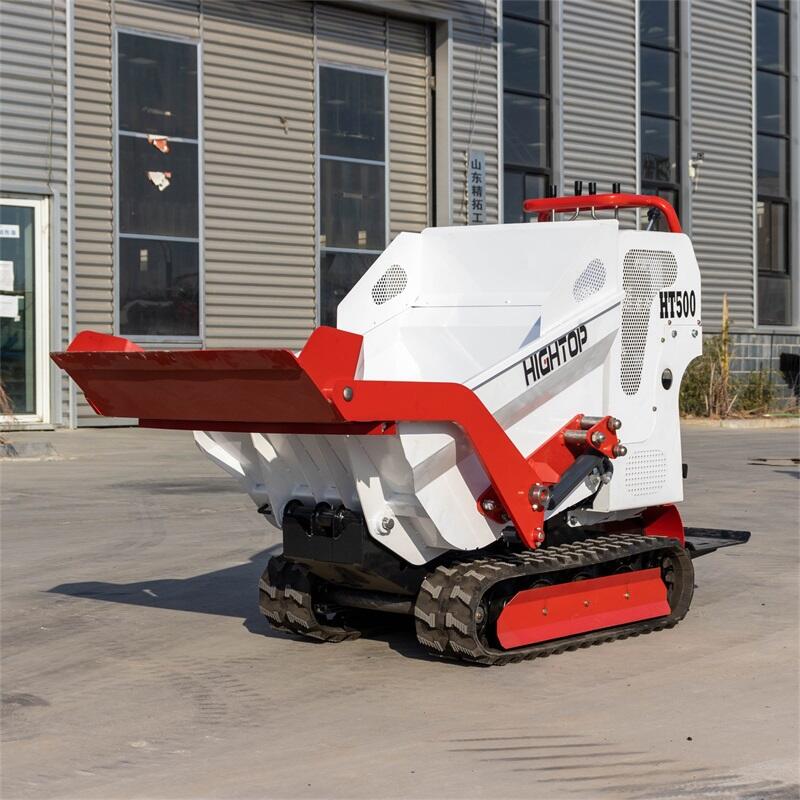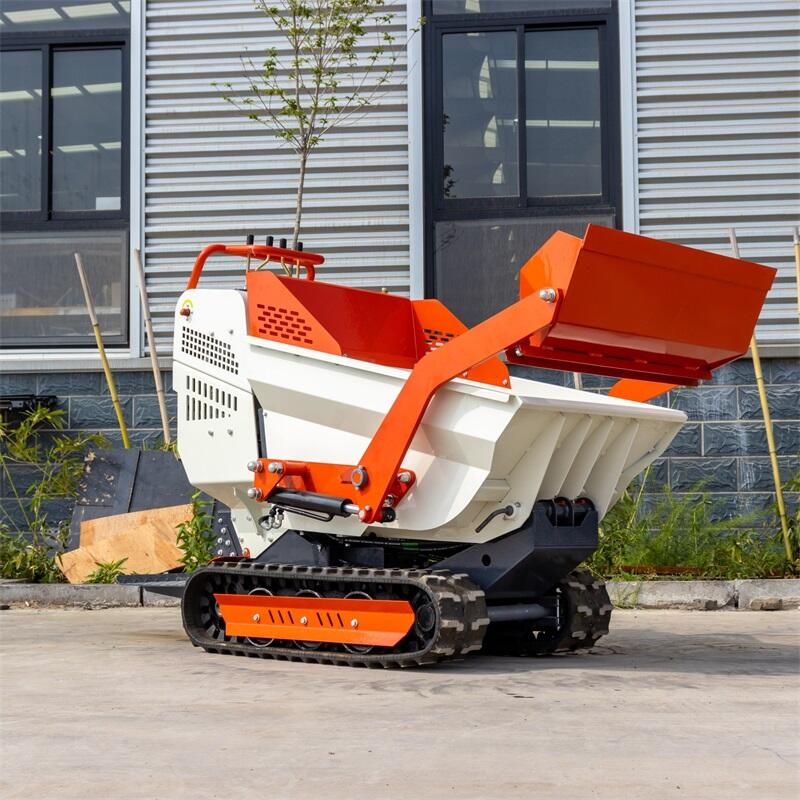Mini Dumpers: Compact and Versatile Solutions for Construction Sites
Key Benefits of Mini Dumpers in Construction
Enhanced Maneuverability in Tight Spaces
Mini dumpers have been built specifically for those tight spots where bigger machinery just won't fit. They can squeeze through narrow alleys and tight corners on city construction sites without causing chaos. The thing about these little workhorses is their tiny size lets workers get into places that regular trucks and excavators simply cannot reach. When projects run behind schedule because of space constraints, having something that moves around so effortlessly makes all the difference. Take downtown construction zones for example. Mini dumpers help keep things organized while moving materials around without blocking traffic or creating hazards for pedestrians walking nearby.
Hydraulic Efficiency for Heavy-Duty Tasks
Mini dumpers rely on hydraulic systems designed to move heavy stuff around job sites without breaking a sweat, which definitely boosts productivity across construction projects. These hydraulics do all the hard work when it comes to lifting and dumping materials, taking pressure off workers' backs and keeping everyone safer while they're at it. Take gravel transportation for instance the hydraulics lift those massive loads with ease, cutting down on back strains and other injuries from trying to muscle things around manually. What makes these machines so valuable isn't just their power but also their reliability. When dealing with tough jobs day after day, having hydraulics that won't let you down means mini dumpers have become must-have tools for most construction crews out there.
Cost-Effective Material Handling Solutions
Mini dumpers save money on labor costs and cut down project timelines significantly. They haul much bigger loads than people ever could, which really speeds up material movement around job sites. What's even better is that these little workhorses often take the place of several different pieces of equipment at once. That means fewer vehicles to maintain, less fuel burned overall, and simpler coordination between teams. Construction site supervisors find they can stretch their budgets further when they go with mini dumpers instead of traditional methods. The machines handle rough terrain pretty well too, so there's no drop off in quality or speed just because they're smaller. Most contractors who've made the switch report getting their projects done faster while spending less cash in the long run.
Versatile Applications of Mini Dumpers Across Industries
Construction Site Material Transport
Mini dumpers have become essential on construction sites because they can move heavy stuff like gravel and wet concrete without breaking a sweat. What makes these little workhorses so valuable? They cut down on both time spent and manpower required compared to dragging materials by hand, something that really boosts how fast projects get done. When job sites get packed with equipment and workers, finding space becomes a nightmare. That's where mini dumpers shine for site supervisors trying to get everything moving smoothly despite the chaos. The small size lets operators squeeze past scaffolding, around machinery, even between parked trucks while still getting materials where they need to go. From foundation work right up to finishing touches, these compact loaders keep things rolling when bigger machines just won't fit.
Agricultural and Landscaping Uses
Mini dumpers have become essential on farms where they haul everything from dirt and fertilizer to harvested crops, which really boosts what farmers can get done in a day. These little workhorses cut down on backbreaking labor so workers can focus on other tasks rather than lugging heavy loads around all day long. When it comes to landscaping jobs, the same machines come into play again, carrying bags of soil, saplings, mulch, and equipment across properties. This saves time during those big spring cleanups or when installing new gardens. What makes these machines stand out is their capacity to manage different types of cargo without breaking a sweat, whether someone needs just a few cubic feet of topsoil for a flower bed or multiple truckloads for commercial developments.
Municipal Projects and DIY Home Tasks
Cities often use mini dumpers for cleaning up after storms and keeping parks looking good, which helps make their sustainability goals more achievable since these little machines get public works done faster. Homeowners who like to fix things themselves find them super handy too. When someone's moving mulch around the yard or hauling bricks for a new garden wall, a mini dumper saves backaches and hours of work. From city crews picking up trash after events to folks building patios in their backyards, these small but powerful machines make material handling much simpler. They cut down on labor costs and save time across all sorts of jobs big and small.
HighTop Tools Mini Dumpers: Compact Powerhouses
HT500-1 Mini Dumper: Customized Transition Gear & Foldable Design
The HT500-1 Mini Dumper comes with a transition gear system that lets it handle all sorts of jobs on site. Operators can tweak this gear setup depending on what they need to do, making their work day run smoother and faster. What makes this machine really stand out though is how it folds down compactly. The folding feature means people can actually fit it into regular sized trucks for transportation between sites, something that would be impossible with most other models. And when storage space gets tight at construction yards or warehouses, this compact folded form saves serious room without compromising functionality.
HTD1200 Rotation Mini Dumper: 180° Revolving Hopper & Rubber Tracks
The HTD1200 Rotation Mini Dumper features a 180 degree rotating hopper that lets operators dump materials exactly where they need them without constantly moving the machine around. Workers save a lot of time on site because they don't have to keep adjusting position just to get the material placed properly. The machine also has tough rubber tracks that grip well even when conditions get rough or rocky. These tracks give the dumper solid stability across different ground types. Because of these characteristics, the HTD1200 works great whether it's being used on construction projects or out in fields for farming operations where terrain can vary quite a bit from one spot to another.
HT500-2 Mini Dumper: High-Efficiency Engine & Detachable Protection
The HT500-2 Mini Dumper comes equipped with an efficient engine that helps cut down on fuel usage and saves money over time, which makes sense for anyone looking at long term expenses. What sets this model apart are the removable protective parts that let operators handle all sorts of different materials with greater flexibility. Safety remains a priority throughout, but users won't find themselves struggling with complicated controls or lost functionality. For those working on smaller jobs or managing materials day to day, this dumper stands out as a dependable workhorse that gets the job done without breaking the bank.
Choosing Between Mini Dumpers and Mini Excavators
Terrain Adaptability: Tracked vs. Wheeled Systems
Picking between mini dumpers and mini excavators really comes down to how well they handle different ground types. Most mini dumpers have wheels, so they work best on roads, sidewalks, and other solid surfaces where there's no mud or loose dirt getting in the way. Mini excavators tell a different story though. These machines come with tracks instead of wheels, giving them much better grip when moving around in muddy fields, construction sites, or anywhere else where regular tires would just spin out. The difference matters a lot in real world situations. A tracked excavator can climb over rocks and rough patches that would stop a wheeled dumper dead in its tracks. For contractors working on varied projects across multiple locations, this kind of flexibility makes all the difference between getting the job done right and having to bring in extra equipment later on.
Project Scale Considerations
The size of the job really matters when deciding between mini dumpers and mini excavators for construction work. Mini dumpers work best on small jobs where there isn't much room to maneuver because they're so compact and can turn around easily in tight spots. On the flip side, mini excavators tackle bigger projects that require digging deeper holes or moving heavier materials across longer distances. Their arms can reach further too, which makes them indispensable for certain tasks. Contractors need to look closely at what kind of work lies ahead before renting or buying either machine. Getting this right means having the right tool for the job without wasting time or money on something that doesn't fit the situation properly.
Cost Comparison with Small Excavators
Looking at the price tags of mini dumpers versus mini excavators shows some pretty significant money matters. Dumpers usually cost less when first purchased and run cheaper day to day than those bigger excavator machines. Small businesses, particularly new ones getting off the ground, need to know these numbers if they want their cash to go further. When companies get clear on what each piece actually costs them, they make smarter choices about which equipment fits both their wallet and their work needs without sacrificing performance. Getting this right helps plan for the future better and means resources aren't wasted on expensive toys that don't pay off.



